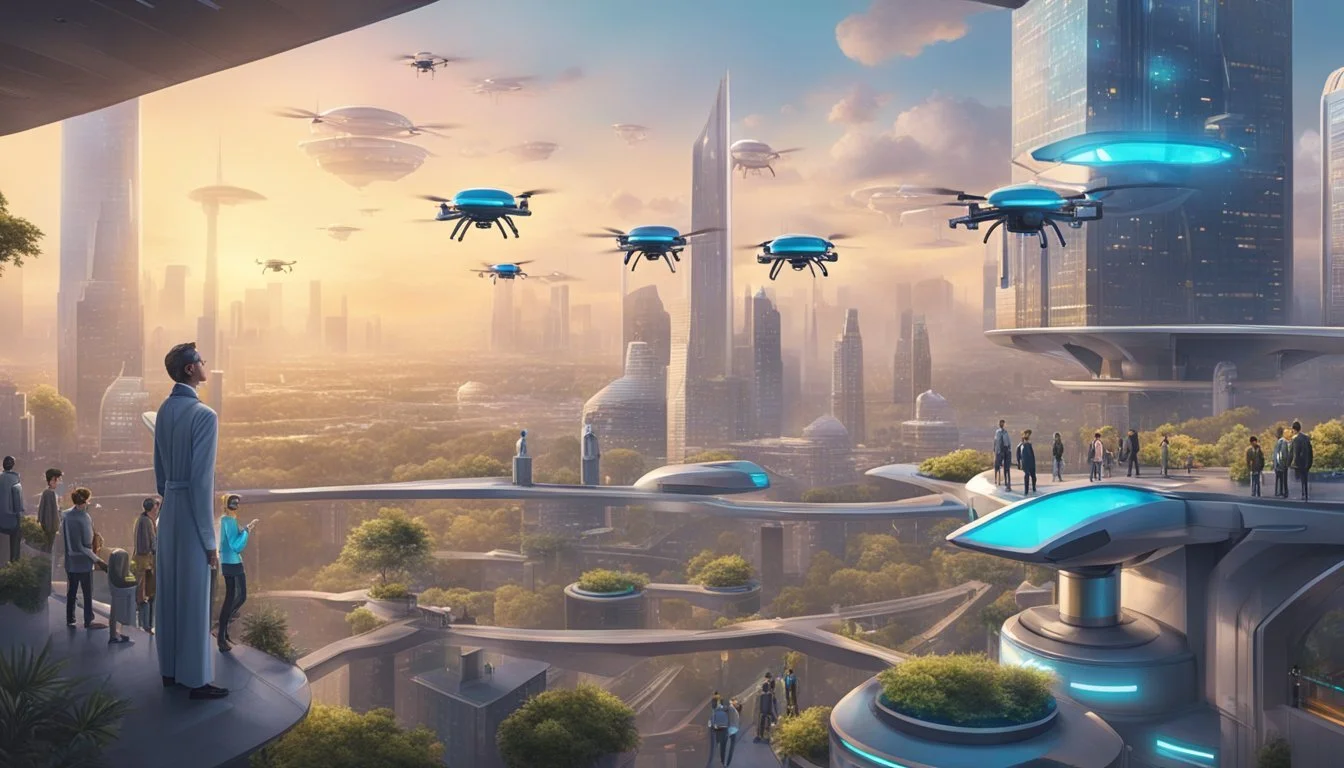5 Documentaries That Show How Artificial Intelligence Is Outsmarting Humans
The Rise of Machine Superiority
Artificial intelligence has become a pivotal force in shaping our modern world. As AI systems grow more sophisticated, they are increasingly demonstrating capabilities that surpass human performance in various domains. This has sparked both excitement and concern among experts and the general public alike.
Documentaries offer a compelling medium to explore the complex relationship between humans and AI. Through interviews, case studies, and expert analyses, these films provide insights into how artificial intelligence is advancing rapidly and outperforming humans in certain tasks. They shed light on the potential benefits and risks associated with this technological revolution, prompting viewers to consider the implications for society, ethics, and the future of human-machine interaction.
1) "The Great Hack" directed by Karim Amer and Jehane Noujaim
"The Great Hack" examines the Cambridge Analytica scandal and its impact on global politics. The documentary explores how personal data became a valuable commodity in the digital age.
Directors Karim Amer and Jehane Noujaim present a chilling look at information warfare. They showcase how data-driven strategies influenced major political events like the 2016 U.S. presidential election and the Brexit referendum.
The film features key figures involved in the scandal, including former Cambridge Analytica employee Brittany Kaiser. It reveals the extent of data collection and manipulation used to target voters.
"The Great Hack" raises important questions about privacy, democracy, and the power of big tech companies. It demonstrates how artificial intelligence and data analytics can be used to shape public opinion on a massive scale.
The documentary serves as a wake-up call, highlighting the need for greater awareness and regulation of data practices in the digital era.
https://www.netflix.com/title/80117542
2) "Coded Bias" directed by Shalini Kantayya
"Coded Bias" explores the intersection of artificial intelligence and human biases. The documentary showcases how AI systems can perpetuate and amplify existing societal prejudices, particularly in areas like facial recognition technology.
Shalini Kantayya's film follows MIT researcher Joy Buolamwini, who discovers significant racial and gender bias in AI algorithms. This revelation sparks a deeper investigation into the far-reaching consequences of biased AI systems in various sectors.
The documentary highlights how AI-driven decision-making processes in hiring, lending, and law enforcement can disproportionately affect marginalized communities. It raises important questions about the ethical implications of relying on potentially flawed AI systems.
"Coded Bias" serves as a wake-up call, urging viewers to critically examine the role of AI in society. The film emphasizes the need for diverse perspectives in AI development to create more equitable and inclusive technologies.
https://www.imdb.com/title/tt11394170/
3) "AlphaGo" directed by Greg Kohs
"AlphaGo" documents the historic match between artificial intelligence and human intelligence in the complex board game of Go. The film follows the DeepMind Challenge Match in South Korea in March 2016.
Google's AI program AlphaGo faces off against Lee Sedol, one of the world's top Go players. The competition pits cutting-edge machine learning against human intuition and experience.
Director Greg Kohs captures the tension and excitement of the five-game tournament. The film explores the implications of AI surpassing human abilities in a game long considered too intricate for computers to master.
Viewers witness the emotional journey of Lee Sedol as he grapples with the AI's unexpected moves and strategies. The documentary also showcases the DeepMind team's reactions as their creation performs beyond expectations.
"AlphaGo" provides insight into the rapid advancement of AI technology and its potential impact on various fields. It raises questions about the future relationship between humans and intelligent machines.
4) "We Need to Talk About A.I." directed by Leanne Pooley
Leanne Pooley's 2020 documentary "We Need to Talk About A.I." explores the potential impacts of artificial intelligence on our world. The film features insights from experts in the field, including James Cameron, Sam Harris, and Bryan Johnson.
The documentary examines the rapid evolution of computer technology and its implications for the future. It discusses the possibility of computers gaining the ability to design and program themselves without human intervention.
Pooley's film presents a balanced view of AI's potential, weighing both the promises and risks associated with this technology. It encourages viewers to consider the ethical implications of AI development and its potential effects on society.
"We Need to Talk About A.I." serves as a thought-provoking exploration of a future that may be difficult to imagine. The documentary aims to spark important conversations about the role of AI in shaping our world.
https://www.imdb.com/title/tt11515078/
5) "The Social Dilemma" directed by Jeff Orlowski
"The Social Dilemma" examines the impact of social media and technology on society. Released in 2020, this documentary features interviews with former executives from major tech companies.
The film explores how social media platforms are designed to capture and monetize user attention. It highlights the psychological tactics employed to keep users engaged and the resulting effects on mental health and social behavior.
Orlowski's documentary raises concerns about the spread of misinformation and its influence on political polarization. It presents a stark view of how artificial intelligence algorithms shape our online experiences and offline decisions.
The film argues that AI-driven recommendation systems are outpacing human decision-making, leading to unintended societal consequences. It emphasizes the need for ethical considerations in technology development and use.
"The Social Dilemma" received critical acclaim for its thought-provoking exploration of technology's impact on humanity. It serves as a wake-up call about the power of AI in shaping modern society.
[https://www.thesocialdilemma.com/]
The Rise of Artificial Intelligence
Artificial intelligence has rapidly evolved from science fiction to everyday reality. Its growth has been fueled by key technological breakthroughs and increasing investment, reshaping industries and human-machine interactions.
Historical Context
The concept of artificial intelligence emerged in the 1950s. Computer scientist Alan Turing proposed the Turing Test in 1950 to evaluate a machine's ability to exhibit intelligent behavior.
In 1956, the term "artificial intelligence" was coined at the Dartmouth Conference. This marked the birth of AI as a formal field of study.
Early AI research focused on problem-solving and symbolic methods. The 1960s and 70s saw the development of expert systems, which mimicked human decision-making processes.
AI faced setbacks in the 1970s and 80s during the "AI winter," when progress slowed due to limited computing power and high expectations.
Key Technological Advances
Machine learning algorithms have been crucial to AI's recent progress. These systems learn from data, improving their performance over time without explicit programming.
Deep learning, a subset of machine learning using neural networks, has driven breakthroughs in image and speech recognition.
Increased computing power, especially through GPUs and cloud computing, has enabled the processing of massive datasets.
Big data availability has provided the fuel for AI systems to learn and improve. This includes text, images, videos, and sensor data from various sources.
Natural language processing has advanced significantly, powering virtual assistants and language translation services.
Computer vision technology has improved dramatically, enabling applications in autonomous vehicles, facial recognition, and medical imaging.
Impact On Human Intelligence
Artificial intelligence is rapidly transforming human cognitive capabilities and decision-making processes. These changes are reshaping how we think, learn, and solve problems in profound ways.
Cognitive Enhancements
AI systems are augmenting human intelligence in various domains. Machine learning algorithms help researchers analyze vast datasets and uncover patterns beyond human perception. In medicine, AI assists doctors in diagnosing diseases more accurately by processing medical images and patient data.
Natural language processing improves language translation, enabling seamless cross-cultural communication. AI-powered educational tools provide personalized learning experiences, adapting to individual student needs. Virtual assistants like Siri and Alexa extend human memory and information access.
Brain-computer interfaces allow direct communication between the brain and external devices, potentially enhancing cognitive functions. As these technologies advance, the line between human and artificial intelligence may continue to blur.
Automation Of Decision-Making
AI is increasingly taking over complex decision-making tasks across industries. Algorithmic trading systems execute financial transactions at superhuman speeds. Autonomous vehicles navigate roads using sensors and real-time data processing.
AI-powered recommendation systems influence consumer choices on platforms like Netflix and Amazon. In healthcare, machine learning models assist in treatment planning by analyzing patient data and medical literature.
Predictive policing algorithms aim to allocate law enforcement resources more efficiently. AI systems also support military strategy and tactical decision-making.
This automation raises ethical concerns about human oversight and accountability. As AI becomes more sophisticated, society must grapple with questions of when to rely on machine intelligence versus human judgment.


